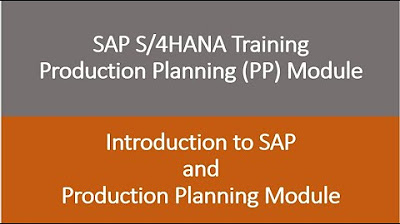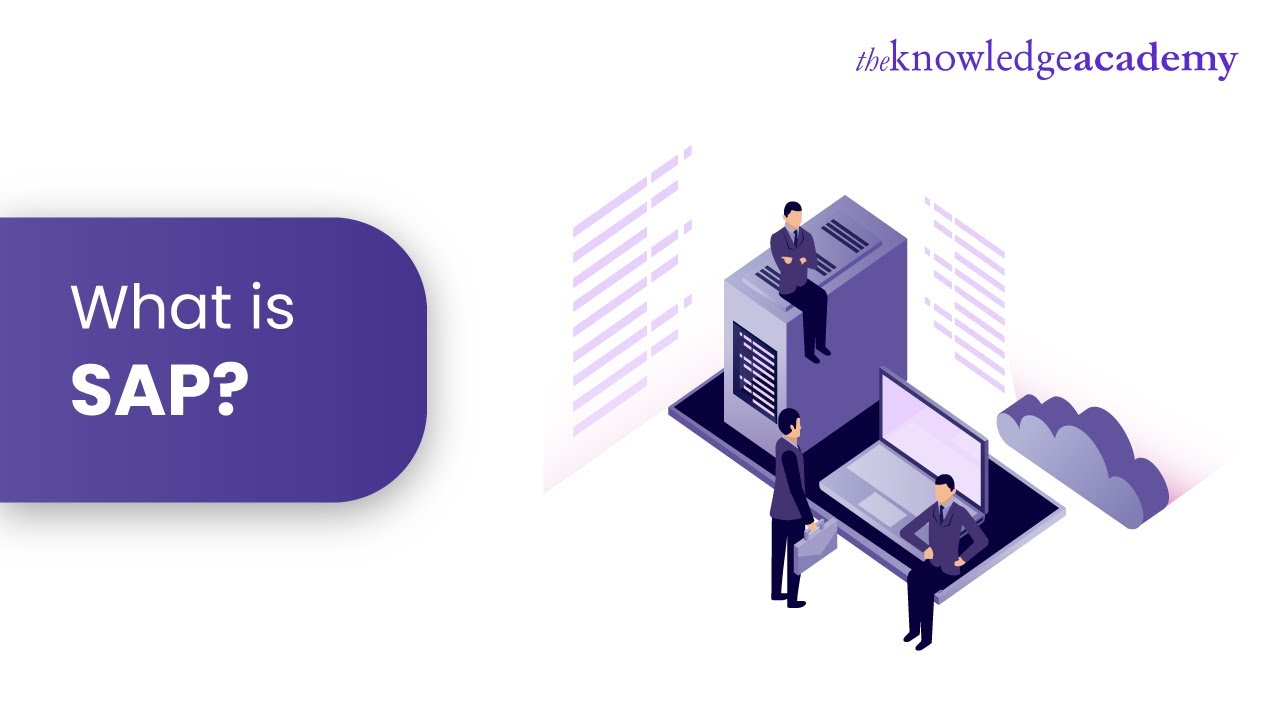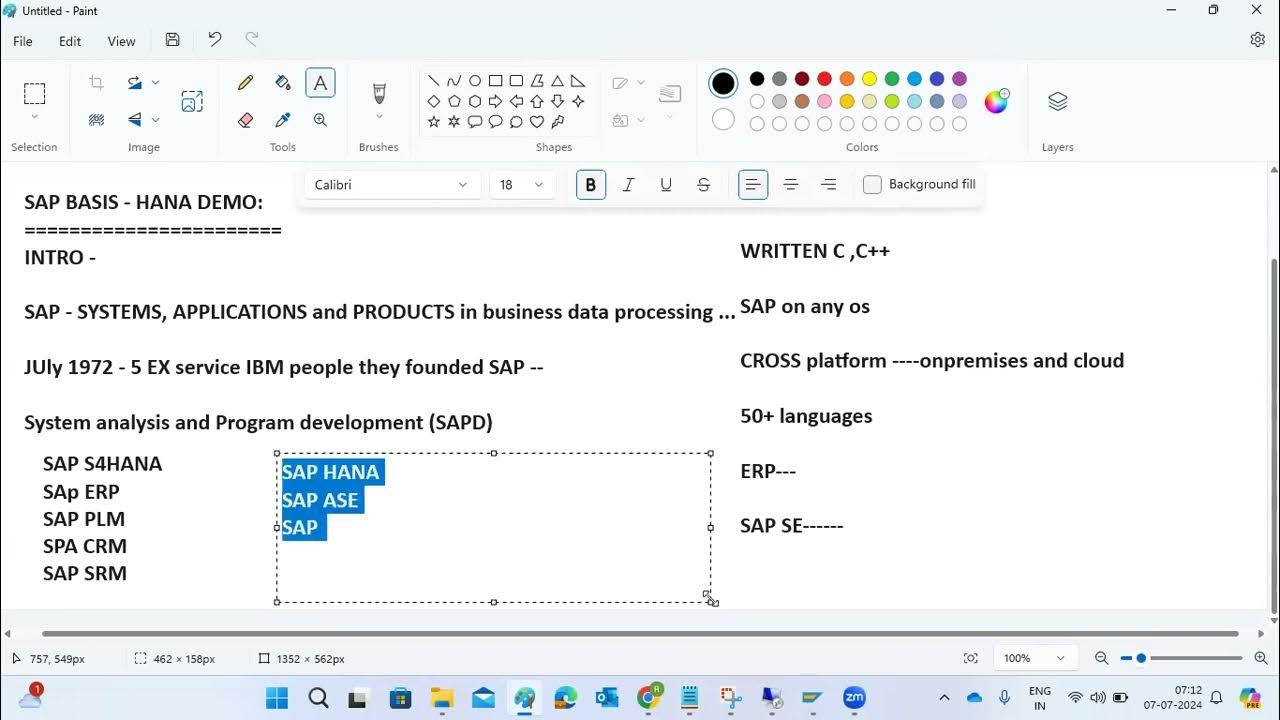SAP S4HANA BASIS- DEMO
Summary
TLDRThe script offers an introduction to SAP, a German multinational software company renowned for its ERP solutions. It delves into SAP's history, beginning in 1972 by five ex-IBM employees, and its evolution to serve global businesses with on-premise and cloud applications. The focus is on SAP's technical foundation, the SAP Basis, which is essential for system administration and ensuring optimal performance of SAP applications. The script also outlines the role of a SAP Basis consultant, the architecture of SAP systems, and touches on the transition from ECC to S/4HANA, highlighting the importance of adapting to new technologies.
Takeaways
- 🌟 SAP is a German multinational software company known for its ERP software that manages business operations and customer relationships.
- 📚 Founded in 1972 by five ex-IBM employees, SAP has grown to become a leading provider of enterprise software solutions.
- 💹 As of 2023, SAP's revenue stands at over 31 billion dollars, reflecting its widespread adoption in the business world.
- 🌐 SAP offers a range of products, including ERP solutions like S/4HANA, CRM, and SCM, as well as the SAP HANA database and cloud services.
- 🔧 SAP Basis is a critical technical module that provides the foundation and administration layer for SAP systems, ensuring they operate smoothly.
- 🛠️ The role of a SAP Basis consultant involves managing the technical infrastructure, including operating systems, databases, and applications.
- 🔑 SAP operates on a three-tier architecture, consisting of the presentation layer, application layer, and database layer.
- 🚀 SAP has evolved through various architectural versions, from R/1 to R/3, and now S/4 HANA, which represents a simplified, fourth-generation business suite.
- 🔄 SAP Basis consultants are responsible for tasks such as system installation, configuration, maintenance, and daily support activities.
- 🔒 They also manage user administration, security, and ensure compliance with best practices for system functionality and performance.
- 📈 The course outlined in the script covers in-depth topics like SAP architecture, user management, HANA upgrades, and new features, providing a comprehensive understanding of SAP Basis.
Q & A
What is SAP and what does it stand for?
-SAP is a German multinational software company that stands for 'System Applications and Products in Data Processing'. It specializes in enterprise software to manage business operations and customer relations.
When was SAP founded and by whom?
-SAP was founded in 1972 by five ex-IBM employees. They initially started as a private partnership focusing on system analysis and software development.
What is the significance of the year 2027 for SAP's ECC systems?
-The year 2027 is significant because it marks the end of maintenance for SAP's ECC systems, with the last maintenance stream ending in December 2027.
What is the S4/HANA architecture in the context of SAP systems?
-S4/HANA is the next-generation business suite from SAP, which is a simplified fourth-generation architecture designed to run on the SAP HANA in-memory database platform.
What does the acronym 'BASIS' refer to in the context of SAP?
-In SAP, 'BASIS' refers to the technical foundation and administration layer of the SAP system, which provides the tools and services needed to manage the SAP system, including applications like R/3 and CRM.
What are the three layers of the SAP architecture?
-The three layers of the SAP architecture are the presentation layer, the application layer, and the database layer, which together form the R/3 architecture.
What is the role of a SAP BASIS consultant?
-A SAP BASIS consultant is responsible for the technical foundation of the SAP system, including installation, configuration, maintenance, and daily support activities, ensuring the system operates smoothly.
What does the acronym 'ERP' stand for and how is it related to SAP?
-ERP stands for 'Enterprise Resource Planning'. It is related to SAP as it refers to the type of software SAP provides, which is designed to manage and integrate a company's core business processes.
What are some of the modules that SAP ERP products include?
-Some of the modules included in SAP ERP products are FICO (Financial Accounting and Controlling), SD (Sales and Distribution), MM (Materials Management), and CRM (Customer Relationship Management).
What is the significance of the number '2,000' mentioned in the script in relation to SAP installations?
-The number '2,000' mentioned in the script refers to the approximate number of SAP installations worldwide, indicating the widespread use of SAP software across various industries.
What is the role of the SAP BASIS team in managing the SAP system?
-The SAP BASIS team is the core technical foundation responsible for managing the operating systems, databases, and applications within the SAP system, ensuring optimal performance and functionality.
Outlines

This section is available to paid users only. Please upgrade to access this part.
Upgrade NowMindmap

This section is available to paid users only. Please upgrade to access this part.
Upgrade NowKeywords

This section is available to paid users only. Please upgrade to access this part.
Upgrade NowHighlights

This section is available to paid users only. Please upgrade to access this part.
Upgrade NowTranscripts

This section is available to paid users only. Please upgrade to access this part.
Upgrade NowBrowse More Related Video

What Is SAP For Beginners? | The Only Video You Need To Watch!

SAP01 UNIT 1 INTRODUCTION

Video 01 - SAP S/4HANA Production Planning (PP) Module training - Introduction to SAP and PP

What is SAP - The Absolute Beginner's Guide

What Is SAP | SAP Training | SAP Explained In 4 Minutes | Learn SAP | The Knowledge Academy

SAP BASIS & HANA - DEMO
5.0 / 5 (0 votes)